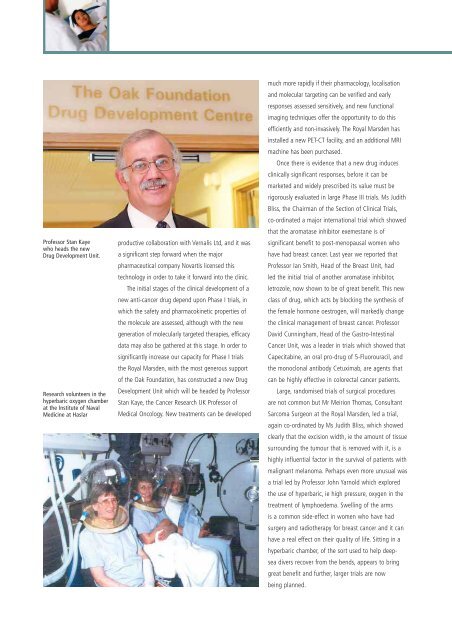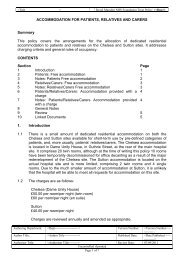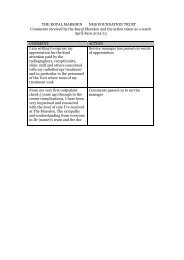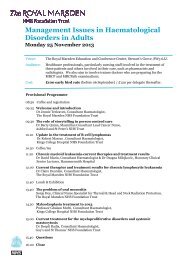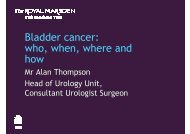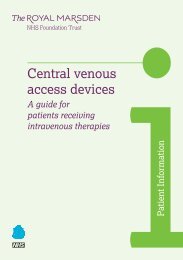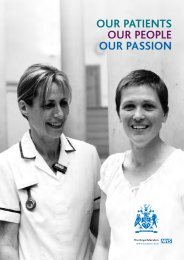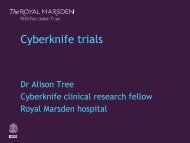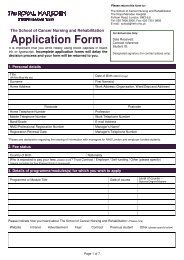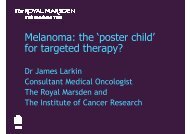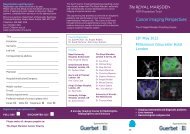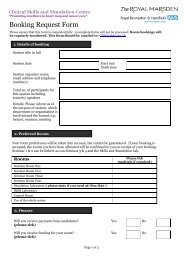Joint Annual Research Report 2004 - The Royal Marsden
Joint Annual Research Report 2004 - The Royal Marsden
Joint Annual Research Report 2004 - The Royal Marsden
You also want an ePaper? Increase the reach of your titles
YUMPU automatically turns print PDFs into web optimized ePapers that Google loves.
Professor Stan Kaye<br />
who heads the new<br />
Drug Development Unit.<br />
<strong>Research</strong> volunteers in the<br />
hyperbaric oxygen chamber<br />
at the Institute of Naval<br />
Medicine at Haslar<br />
productive collaboration with Vernalis Ltd, and it was<br />
a significant step forward when the major<br />
pharmaceutical company Novartis licensed this<br />
technology in order to take it forward into the clinic.<br />
<strong>The</strong> initial stages of the clinical development of a<br />
new anti-cancer drug depend upon Phase I trials, in<br />
which the safety and pharmacokinetic properties of<br />
the molecule are assessed, although with the new<br />
generation of molecularly targeted therapies, efficacy<br />
data may also be gathered at this stage. In order to<br />
significantly increase our capacity for Phase I trials<br />
the <strong>Royal</strong> <strong>Marsden</strong>, with the most generous support<br />
of the Oak Foundation, has constructed a new Drug<br />
Development Unit which will be headed by Professor<br />
Stan Kaye, the Cancer <strong>Research</strong> UK Professor of<br />
Medical Oncology. New treatments can be developed<br />
much more rapidly if their pharmacology, localisation<br />
and molecular targeting can be verified and early<br />
responses assessed sensitively, and new functional<br />
imaging techniques offer the opportunity to do this<br />
efficiently and non-invasively. <strong>The</strong> <strong>Royal</strong> <strong>Marsden</strong> has<br />
installed a new PET-CT facility, and an additional MRI<br />
machine has been purchased.<br />
Once there is evidence that a new drug induces<br />
clinically significant responses, before it can be<br />
marketed and widely prescribed its value must be<br />
rigorously evaluated in large Phase III trials. Ms Judith<br />
Bliss, the Chairman of the Section of Clinical Trials,<br />
co-ordinated a major international trial which showed<br />
that the aromatase inhibitor exemestane is of<br />
significant benefit to post-menopausal women who<br />
have had breast cancer. Last year we reported that<br />
Professor Ian Smith, Head of the Breast Unit, had<br />
led the initial trial of another aromatase inhibitor,<br />
letrozole, now shown to be of great benefit. This new<br />
class of drug, which acts by blocking the synthesis of<br />
the female hormone oestrogen, will markedly change<br />
the clinical management of breast cancer. Professor<br />
David Cunningham, Head of the Gastro-Intestinal<br />
Cancer Unit, was a leader in trials which showed that<br />
Capecitabine, an oral pro-drug of 5-Fluorouracil, and<br />
the monoclonal antibody Cetuximab, are agents that<br />
can be highly effective in colorectal cancer patients.<br />
Large, randomised trials of surgical procedures<br />
are not common but Mr Meirion Thomas, Consultant<br />
Sarcoma Surgeon at the <strong>Royal</strong> <strong>Marsden</strong>, led a trial,<br />
again co-ordinated by Ms Judith Bliss, which showed<br />
clearly that the excision width, ie the amount of tissue<br />
surrounding the tumour that is removed with it, is a<br />
highly influential factor in the survival of patients with<br />
malignant melanoma. Perhaps even more unusual was<br />
a trial led by Professor John Yarnold which explored<br />
the use of hyperbaric, ie high pressure, oxygen in the<br />
treatment of lymphoedema. Swelling of the arms<br />
is a common side-effect in women who have had<br />
surgery and radiotherapy for breast cancer and it can<br />
have a real effect on their quality of life. Sitting in a<br />
hyperbaric chamber, of the sort used to help deepsea<br />
divers recover from the bends, appears to bring<br />
great benefit and further, larger trials are now<br />
being planned.


